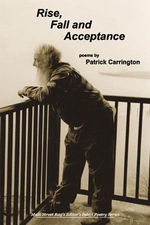Rise, Fall and Acceptance by Patrick Carrington
Main Street Rag Publishing Company
Price: $12
80 Pages/ 56 Poems
ISBN: 1-59948-042-5
Review by Charles Ries
Rise, Fall and Acceptance is Patrick Carrington's first collection of poetry. For a first outing, this is an exceptional work. Its depth and workmanship suggest poetry born over a long period of time and many rounds of edits. This diligence is found not only in the written word, but in the meticulous care taken with line breaks and stanzas. Here is an example from "Brothers On the Crossed Hill": "Do you forget who lies / under the wild grass, / disgracing with your lips / this hill his horses rode, / their hooves and his / flattening the green blanket, / that mighty rug / that tops him now?"
I asked his publisher M. Scott Douglas of Main Street Rag why he chose to publish this collection of poems. Here is what he told me, "I am often asked why Main Street Rag chooses a particular manuscript for publication. Time and again the deciding factor is the way the words come alive on the page. Rise, Fall and Acceptance by Patrick Carrington was one of these collections that caught my attention not just by its organization, its great use of words - particularly action verbs - but because the poems were alive with experience and involve the reader. Mr. Carrington gathered a collection of sometimes very personal poems in a way that avoids the maudlin and mushy and draws the reader into the experiences that inspired this collection."
The tone of the poems in this collection is quite formal, and I wondered if Carrington had training as a writer, "I have advanced degrees in English Literature and Education. But for the most part, what I have learned about poetry has been self-guided and self-taught through enormous amounts of reading and research and a good deal of common sense. I do teach writing for a living and have taught at levels ranging from junior high to honors level high school seniors. I also tutor privately. I did this when I knew writing is what I both love most and what treats me best emotionally and spiritually."
I was surprised to learn that while Carrington was not new to writing he was very new to poetry. He told me, "I wrote and submitted my first poem a bit over two years ago. Four years ago I began reading poetry, and simply fell in love with it. It became my daily leisure activity, and still is. I began devouring everything I could get my hands on. And one night, after reading a poem I fancied very much, a voice popped into my head. "I think I can do this," it said. He went on to say, "There's a finished novel gathering dust on my shelf. A first draft, completely unedited. If the mad dog of poetry ever stops nipping at my ankles, I might find time to repair it someday."
No question but that Carrington is a strong writer, but I sometimes struggled not to get bogged down by his excessive use of metaphor and image. Granted many of these poems are image driven and set upon a delicate narrative framework, but I wanted some of the poems to be trimmed back. I wanted him to weave some straightforward language into these pieces as a way to balance their complexity. Here is an example from "Balancing Pens In Belfast": "By day the seams and shadows / of their ruin unstitch and steal / my air and crush my bones / their powered hair and homes /that puff and fall in winter's winds / and hand, the swinging noose / of England choking rough / and tumble songs they sang / in tall and long defiance, / defense of son and land." And again in his poem "Strawberry Moon": "Strawberry moon spreads its will / like jam, sweet with sugars / of song and sunfade, and I see / the back of sadness break. // Mockingbirds scoop the music / of a stream and fly it to the trees, / share the throat of that new sisters // as they sing. Rich with birds, // the willows whistle and dance, / waving their fronds like the wings / of their siblings. The tender joinings // of evening call me, / water to wing to willow." His language is beautiful, but at times slips over the too sweet for me line.
Since his poetry is quite structured I wondered who had influenced and shaped his poetic voice and the choices he makes when constructing a poem. He told me, "There is such a large number of poets/writers, past and present, whom I love to read. Too many to list, but here are a few: T. S. Eliot and Dylan Thomas. Hemingway and Steinbeck, whose prose reads to me like poetry without line breaks. And so many of today's poets knock me out: Tony Hoagland and Bob Hicok. Kim Addonizio. Mary Oliver. Subconsciously, I'm sure they have all influenced me to some degree. They're boiling in my head, like a bouillabaisse. My own writing cannot help but be imitative of that stew, to some degree."


